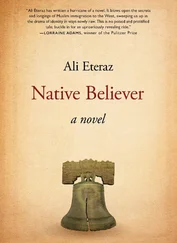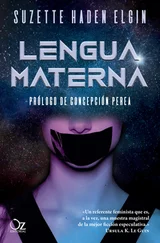Here were women who had spent their lifetimes in unremitting work. The twenty-three who were her patients were not victims of illnesses, for the most part; they were simply exhausted. Like very old domestic animals who had been worked until one day they lay down and just could not get up again; that’s what they were like. They were not indifferent to the problems of the public… they were concerned about the affairs of the Chornyaks, certainly, but so was anyone concerned about their own families. But they cared just as much for the problems of the public at large as did any other citizens. They were just as interested in the latest events in the colonies, just as excited about the newest discoveries in the sciences, just as eager to hear of events in the world and beyond. The aristocratic disdain, the contempt for the “masses,” all that list of repulsive characteristics she’d been brought up believing marked the woman linguist — none of it was to be found in them. Not in the women she tended. And not in the other twenty who were not her patients.
They were not perfect, were not saints — if they had been, it would have been easier, because they would have been so other . Some of them were petty and silly. Some did everything to excess — for example, there were the absurdities of Aquina Chornyak, which seemed endless. But it was just the sort of distribution of imperfections that you would expect to find in any group of women of such a size. No more, and no less. And their devotion to one another, not just to the invalids who might have called to any woman’s compassion but devotion even to the most irritating among them, touched Michaela’s heart.
She had not seen anything like this outside the Lines. But then outside the Lines women never were together in this way. Every woman was alone in her own house, tending to the needs of her own husband and her own children, until she was of an age when she was sent to a hospital to die — all alone in a private room. Women, asked to consider living as did these linguist women, would have said that the prospect was horrible and declared that nothing could make them choose such a life; Michaela was sure of it. But perhaps they would have been to one another as the linguist women were, if they’d had the opportunity; how could anyone know? It didn’t matter, because other women were never going to have what these women had, they were always going to be shut up, one or two to a house, never going out except as the displayed possession of some man.
These women, living as they did, were wonderful to watch. She envied them what they had, but she could not hate them for it — she had seen in her first post, at Verdi Household, that the women of the Lines were as totally subjugated to the men as any women anywhere. They went out into the world to work, but they had no privileges. The situation was in no way their fault.
How was she to kill them?
But if she did not kill them… then the awful thought could not be kept out of her mind: perhaps she was wrong to have killed the others. Not Ned; she would never believe she had been wrong to kill Ned. But the other linguists? They had been male linguists, but still… it was a seed she could not allow to grow and yet it grew when she was sleeping. What if the male linguists were as innocent of the things she had been taught all her life long to blame them for as the women were? What if she had killed not to do her part in freeing her nation of a pestilence but out of a naïve belief in a stereotype that had no basis in reality? So many things that “everybody knew” had turned out, under her own eyes, to be lies. What if all the rest of the beliefs about linguists were lies, too? And when she remembered that the only evidence she had had for the conviction that linguists were to blame for the baby-slaughter at Government Work was the word of Ned Landry, her stomach twisted viciously. When had Ned Landry ever known any thing, about anything? What if he had been entirely wrong?
Michaela lost more weight, and slept even less, and the women made her herb teas and fussed over her and threatened to call Thomas and tell him his nurse was sicker than her patients.
“You would not really do that,” she said.
“No. We would not really do that. But we would insist that you do it — and we will, if you don’t begin to improve.
She was still fretful, still not at ease in herself, as the time for the Christmas holidays drew near. And then one morning something happened that settled at least one part of the issue for her.
It was a morning when she was doing something that required her nursing skills instead of just her woman-wit. Sophie Ann Lopez, born a Chornyak but married into the Lopez family of the Lines, and then come home to Chornyak Barren House when she was left a widow at eighty, was not one of the bedfast ones. She was ninety-four, and she did not get things done speedily, but she got them done. She was up each morning with the birds, and the absolute limit of her concession to her advancing years was the cane she used for going up and down stairs. The moment she reached the level she was headed for she’d put the cane somewhere, and then in an hour or two everyone would be calling, “Has anybody seen Sophie Ann’s cane?” She hated the cane, and nothing but the almost inevitable prospect of months in bed with a broken hip from tumbling down stairs made her give in and accept even that minimal aid.
But in the cold of mid-December Sophie had caught some sort of infection; it had spread to her kidneys, and finally it had been necessary for a surgeon to come with his lasers and do a bit of minor surgery. It had gone uneventfully, behind the panelled screens with their riot of wild roses and blackberry vines in brilliant wools against a background of deep blue, and the surgeon was off to some other task, leaving Michaela to watch over Sophie Ann as she gradually awoke from the anesthetic.
For a while Michaela had thought her patient was only mumbling noises. And then, struggling through the sedative layers, had come recognizable words.
“It won’t be long now,” Sophie kept saying. “Not long now, I tell you!”
She kept it up until Michaela was first amused and then curious.
“What won’t be long now, dear?” she asked, finally.
“Why, Láadan! What a silly question!”
“What is it, Sophie? Is it a celebration?”
Michaela leaned over and stroked the thin white hair gently away from the damp forehead where it clung in limp strands.
“They’ll see, then,” babbled the old woman. “They’ll see! When the time comes, when we old aunts can begin to talk Láadan to the babies, it won’t be long! And then they’ll be talking pidgin Láadan, but when they speak it to their babies… then! Then! Oh, what a wonderful day!”
It was a language?
“Why, Sophie Ann? Why will it be wonderful?”
“Oh, my, it won’t be long now!”
It had come a scrap at a time until Michaela thought she had at least the rough outlines. These women, and the women of linguistics for generations back, had taken on the task of constructing a language that would be just for women. A language to say the things that women wanted to say, and about which men always said “Why would anybody want to talk about that? ” The name of this language sounded as if Sophie were trying to sing it. And the men didn’t know.
Michaela stood thinking, tending Sophie Ann, and wondering if this was only the anesthetic talking; the old woman seemed very sure, but Michaela had known surgical patients to be very sure of dragons and giant peacocks in the operating room and similar outrageous delusions. If it was true, how could it have happened? How could they have kept it a secret, how could they work on it and not have the men know, supervised as they were? And how could anyone invent a language? Michaela was quite sure that nobody knew just how the first human language had come to be; she was equally sure that God was supposed to have played a prominent part in the becoming… she remembered that much from Homeroom. Hadn’t there been something called a Tower of Babble? Babbling? Something like that?
Читать дальше












